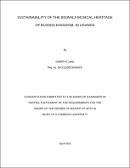Sustainability of the Bigwala musical heritage of Busoga kingdom, in Uganda
Abstract
This study intended to investigate the sustainability of the bigwala musical heritage of
Busoga Kingdom, in Uganda. The escalating extinction of rustic music traditions across the
globe leaves bigwala heritage in a highly threatened situation. Bigwala is played to enthrone a
King of Busoga, during royal funeral rituals, and in the communities. Basoga communities put
in place measures to create a new generation of players by transferring knowledge and skills
from the surviving elders to youths. Given the negative attitude that youths generally have
towards traditions of this nature, it is doubtful that the practice of this heritage will be
sustainable. A phenomenological study approach was used to investigate the viability of this
heritage. The objectives of this study were: to establish the practice of bigwala Musical heritage
in Bugweri and Bukholi chiefdoms in Busoga Kingdom; to find out the threats to the
sustainability of bigwala Musical heritage in Bugweri and Bukholi chiefdoms in Busoga
Kingdom; to suggest ways of ensuring the sustainability of bigwala Musical heritage in Busoga
Kingdom.
Findings revealed that bigwala was entrenched in the Kingdom practices and people
generally revere their cultural institution. This entrenchment as well as the Basoga peoples’
devotion to their cultural institution, and values was found to be the main contributing factor to
the practice of bigwala for many years to come. The Basoga people learn music orally and
aurally and this facilitated the creation of bigwala musical communities with structures for the
continuation of this heritage. It was recommended that bigwala communities should look up
more opportunities for performance of this heritage to increase their economic benefits, involve
school in the practice and write resources for teaching this heritage in schools in case it does not
violate the traditions of the practice altogether.

